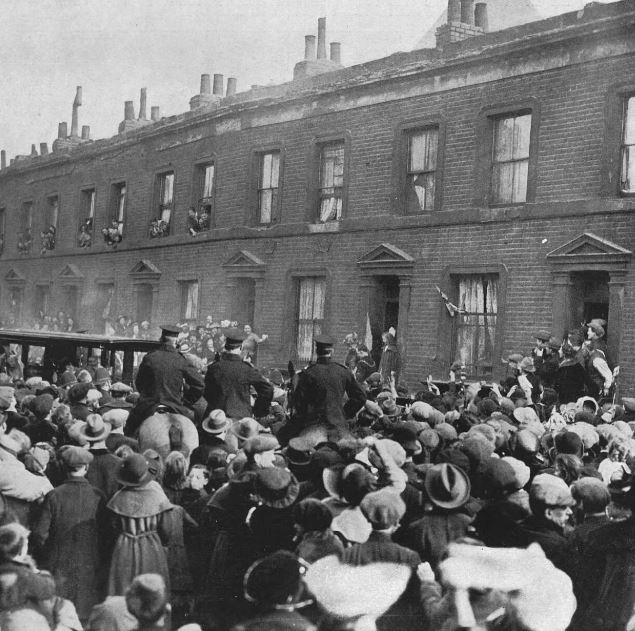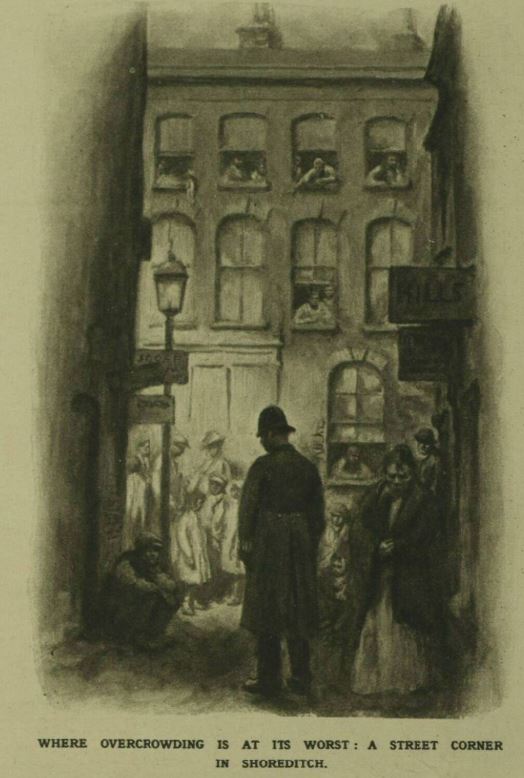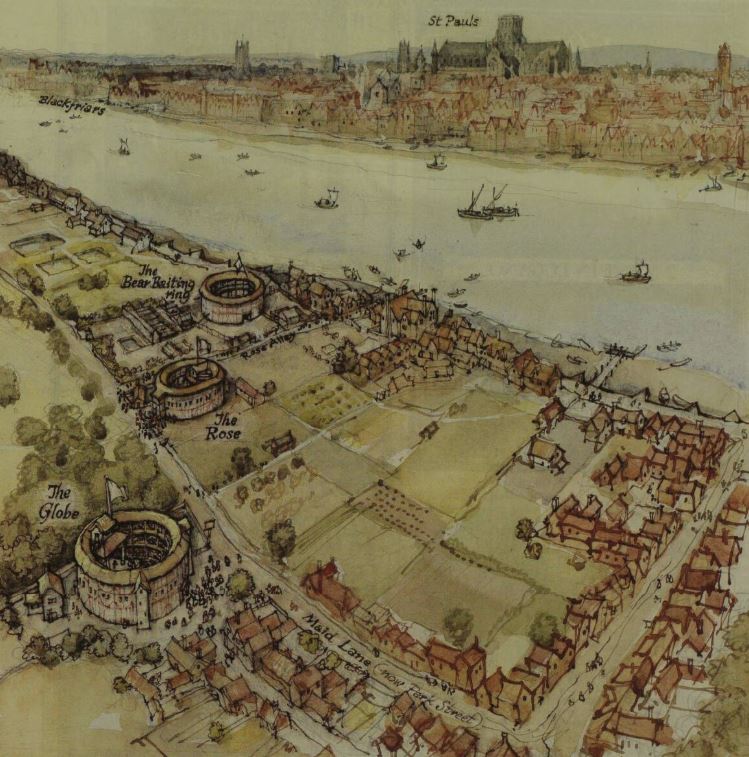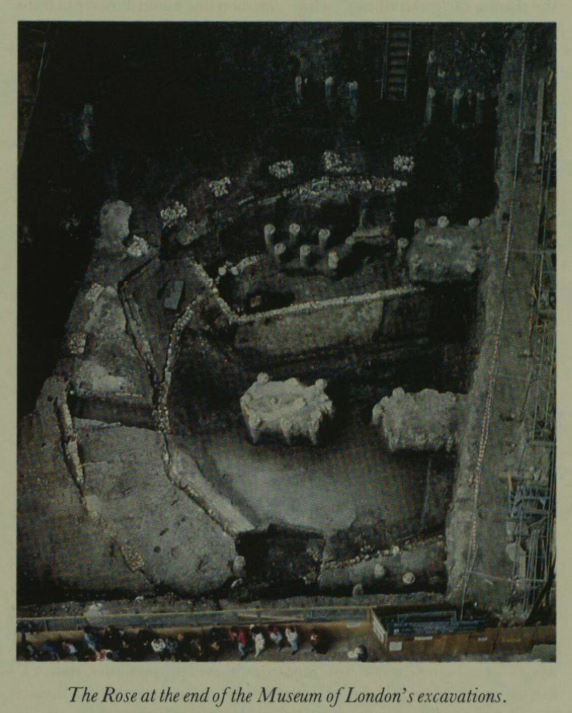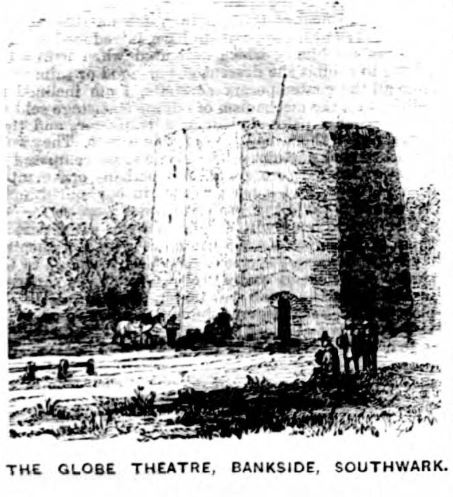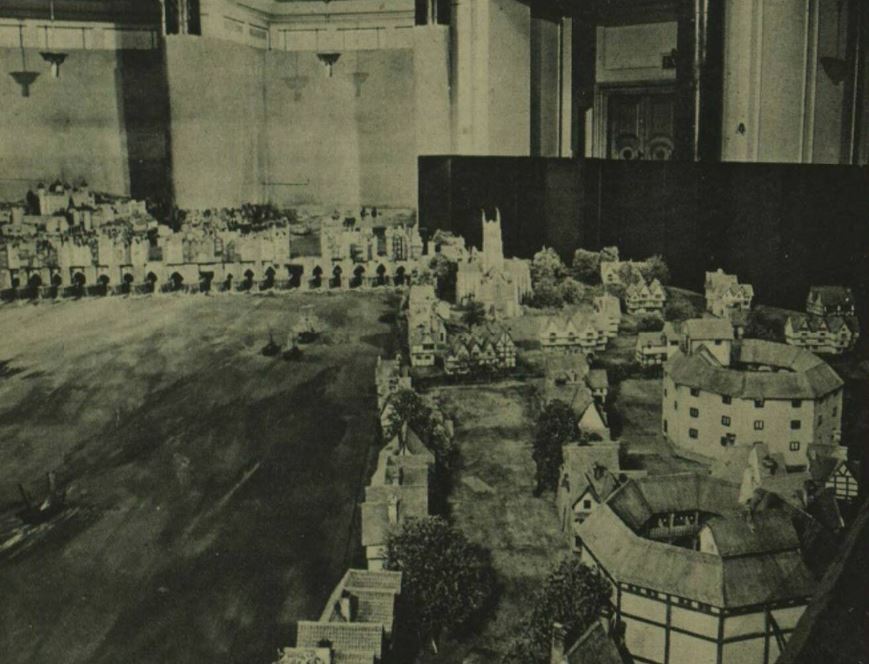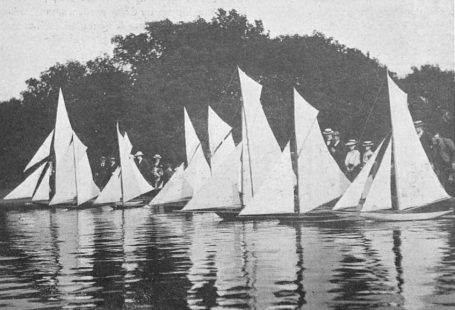As Britannia & Eve relates, ‘In 1586 a young genius of twenty-two, already the father of twins, packed his bags, said good-bye to the fading charms of his older wife, and quitted his home in Stratford-upon-Avon to earn his living in London as an actor.’
This young genius was of course none other than William Shakespeare, about whose life precious little is known. But we do know that it was to London that the bard went, Dick Whittington-like, to pursue his fortune. In this special blog, using pages from the British Newspaper Archive, we uncover Shakespeare’s London – the places where he lived and worked, and where his plays were performed.
Somerset County Gazette | 23 April 1864
Want to learn more? Register now and explore The Archive
Shakespeare and The Slum
The Bedfordshire Times and Independent, December 1928, reports on a lecture given at Bedford School by Albert C Dabbs entitled ‘Shakespeare’s London.’ Dabbs told his audience of how ‘Shakespeare burned to get to London to make a great name,’ and that he entered the city ‘by tramping along Edgware Road’ to reach Holborn Bars.
Not far from Holborn was Shoreditch, home to London’s first playhouse, known simply as the Theatre. The Theatre was built by James Burbage, then head of Lord Leicester’s players. Shakespeare was to have a lasting connection with the Burbages.
The Somerset County Gazette, in their Shakespeare Tercentenary special in 1864, tells of how after settling in Shoreditch. Shakespeare’s ‘first expedient was to wait at the door of the playhouse, and hold the horses of those who had no servants.’ Sometime after that, Shakespeare graduated to acting, and thence to playwriting.
In a 1937 Portsmouth Evening News opinion piece, ‘Bertha’ outlines the connection between the bard and Shoreditch, Shoreditch then being considered a less than salubrious location:
People ask me what connexion there can be between Shakespeare and Shoreditch – the poet and the slum? – that they have so frequently been bracketed together the last few years….they don’t seem to think of Shakespeare as living anywhere else than at Stratford-on-Avon! But it so happens that the link between the poet and place is a strong one, for when he first came to London he lived there.
As well as frequenting the Theatre, Shakespeare probably also frequented the Curtain Theatre, built by another member of the Burbage family. Indeed, some sources say (The Era, May 1909) that he found his first ‘modest employment’ at the Curtain.
The Curtain Theatre gave its name to Curtain Road, still in existence to this day, and the name of this theatre has a provenance of equal interest:
The platform, or stage, was separated from the audience by a railing, and concealed, previous to the commencement of the performance, by a curtain. This, it is said, gave the name to the Curtain Theatre, in which it was first used, and the locality of the theatre still retains the name of the Curtain Road.
Bertha goes on to relate how the ‘theatrical profession’ of the day were keen ‘to bring [Shoreditch] back to its condition as Shakespeare knew it.’ However, she laments the impossibility of this noble aim, describing how ‘all the necessities of life’ have been crowded out in that particular area of the city.
Illustrated London News | 18 October 1919
And Shakespeare himself was not bound to stay in Shoreditch for long, as he made the move across the river to Bankside, Southwark.
Romeo and The Rose
Southwark had long had a reputation for hedonism, well before Shakespeare’s day. Known for its bear-baiting and its brothels, it was ‘Outside the jurisdiction of the puritanical fathers… [and] had a reputation for bawdiness’ (Illustrated London News, December 1989).
Little wonder then, that actors and playwrights were drawn to the area, Shakespeare amongst them. As the London Daily News (April 1904) relates, ‘the connection of William Shakespeare with Southwark is one of the most unquestionable facts in his biography.’ It was of course there that the Globe Theatre was established; but before the Globe there was the Rose.
View of Bankside in Shakespeare’s time | Illustrated London News | 1 December 1989
‘The Rose was the first of the four playhouses that grew up on Bankside,’ and it earned its name from the bawdy pursuits of the area. As the Illustrated London News suggests, ‘it was probably the Medieval Rose ‘stewhouse’ by the river which gave its name to Rose Alley’ and subsequently the nearby theatre, although there were some more innocent rose gardens nearby.
Shakespeare’s contemporary Marlowe staged many of his plays at the Rose, including Dr Faustus. The Era claims that Romeo and Juliet first appeared at the Rose, and the ‘name of the house was in harmony with the play, Romeo and Juliet at the Rose.’
The Rose was a roaring success, but facing competition from the Globe, it is likely to have been demolished in 1606. However, the Rose has still left an imprint on London’s streets. In 1989 an archaeological excavation discovered the remains of the ancient building, the Illustrated London News reporting how ‘a good two-thirds’ of the Rose had been revealed, and how ‘it survived to a far greater degree’ than was to be expected.
Illustrated London News | 1 December 1989
But these fragile remains were under threat. In June 1989 Ian McKellan and other actors rallied to put on the ‘Greatest Show on Earth’ in order to save the site from development. Judi Dench, Glenda Jackson, and Sting came together to protest against developers Imry Merchant’s plan to set a £10 million office block upon the site of the Rose (Aberdeen Press and Journal). McKellan and his fellow actors saw success; the remains of the Rose were saved and can be visited to this day.
‘This Mean Wooden O’
And after the Rose, came of course, the Globe. The Globe was the ‘scene of many of Shakespeare’s triumphs,’ and was built by Richard Burbage (‘the original Hamlet,’ The Era, May 1909) in 1599. Burbage and his brother Cuthbert allegedly carried the timbers from their first playhouse, the Theatre in Shoreditch, across the river to build the Globe, which housed the Lord Chamberlain’s Men.
Shakespeare described the theatre as ‘this mean wooden O,’ and the mean wooden O was to draw in the crowds. However, the Globe’s tenure on Bankside was short-lived. It burnt down in 1613, was rebuilt the next year, only to be closed by the Puritans and eventually pulled down in 1644 to 1645.
Somerset County Gazette | 23 April 1864
The Era gives its readers instructions for locating the famous Globe theatre:
Clink-street, hard by, you may gain Bankside where the London folk landed from boats to witness the play. Thirty or forty paces down Park-street you come to the side entrance of the Anchor Brewery. Enter and look to the left, and there is the spot where Richard Burbage, the great actor, the original Hamlet, set up in 1599 the ‘Globe’ Theatre, which was to become the shrine as it were of the majority of Shakespeare’s masterpieces.
Today we are much more fortunate than The Era’s readers in 1909. In 1997 a modern reconstruction of the Globe was opened, based on twenty years of ‘painstaking research,’ just 750 yards away from the site of the original building. And like its predecessor, the Globe remains ‘a summer theatre,’ left to the open air and without seating just as it would have been during the bard’s day.
Shakespeare was to eventually retire from London and return to his birthplace of Stratford-upon-Avon, where he died on 23rd April 1613. But during his time in London he managed to cement his immortality as one of the world’s most famous and influential writers, and it is possible to trace his steps through the city of London with the help of the British Newspaper Archive.



